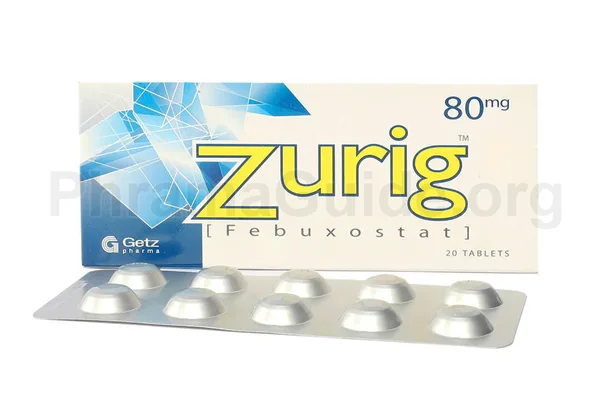Zurig tablet is a medication used to treat gout, a type of arthritis that occurs when high levels of uric acid in the blood cause crystals to form and accumulate in the joints. These crystals can trigger sudden and severe attacks of pain, swelling, and redness in the affected joints. Following are some common uses of Zurig Tablet:
- Gout Treatment: Zurig tablet is commonly used for the long-term management of gout. It inhibits the enzyme xanthine oxidase, which plays a crucial role in the production of uric acid. By reducing uric acid levels, Zurig helps prevent the formation of uric acid crystals and alleviates symptoms of gout, such as joint pain, swelling, and inflammation.
- Prevention of Gout Attacks: By maintaining lower levels of uric acid in the blood, Zurig tablets can help prevent recurrent gout attacks. Regular use of Zurig can reduce the frequency and severity of gout flares.
- Chronic Tophaceous Gout: A tophaceous gout is an advanced form of gout characterized by the development of tophi—hard nodules of urate crystals—in the joints, tendons, and other tissues. Zurig tablets can be used to manage chronic tophaceous gout and prevent further tophi formation.
- Uric Acid Nephropathy: Uric acid nephropathy is a condition in which uric acid crystals accumulate in the kidneys, leading to kidney damage. Zurig tablet is used as a potential treatment to lower uric acid levels and prevent further kidney injury in this condition.
Off-label Uses of Zurig Tablet
- Hyperuricemia in Chronic Kidney Disease (CKD): Zurig tablet is used off-label as a treatment option for managing elevated uric acid levels in patients with CKD. However, the evidence for its efficacy and safety in this population is limited, and individual patient factors need to be considered.
- Tumor Lysis Syndrome (TLS): TLS is a medical emergency that can occur when large numbers of cancer cells are rapidly destroyed, releasing their contents into the bloodstream. This release can lead to metabolic imbalances, including high levels of uric acid. Zurig tablet can be used as a preventive measure to reduce uric acid levels and prevent or manage TLS.
- Cardiovascular Disease: Some studies have suggested a possible link between elevated uric acid levels and cardiovascular disease. As Zurig tablet lowers uric acid levels, it has been trialed as a potential therapy to reduce the risk of cardiovascular events. However, the evidence in this area is still limited, and further research is needed.

What is Zurig?
Zurig is one of the leading brands of Febuxostat, manufactured and marketed by Getz Pharmaceuticals (Pvt) Ltd, Pakistan.
Zurig Alternatives : Other Similar Brands
The following are some alternative brands of Zurig and their manufacturers.
- Urigo : Sami Pharmaceuticals (Pvt) Ltd, Pakistan.
- Gouric : Pharmevo Pakistan (Pvt) Ltd.
- Febux : Consolidated Chemical Laboratories (Pvt) Ltd, Pakistan.
- Uriguard : Atco Laboratories (Ltd) Pakistan.
- Febhil : Hilton Pharmaceuticals (Pvt) Ltd, Pakistan.
- Hiloric : Highnoon Laboratories (Pvt) Ltd, Pakistan.
- Febuxin : AGP Pharma Pakistan.
- Baristat : Barrett Hodgson Pakistan (Pvt) Ltd.
- Febstat : Pharmatec Pakistan (Pvt) Ltd.
- Adenuric : Solace Pharma
Zurig : Available Formulations and Strengths
Presently, Zurig is available in Tablet Form with the following strengths.
Zurig Tablets : 40mg and 80mg strengths.
Who Should Not Use Zurig?
Zurig has certain contraindications, which means there are specific situations in which its use is not recommended due to potential risks.
Hypersensitivity or allergic reaction: If you have had a previous hypersensitivity or allergic reaction to Zurig or any of its components, it is contraindicated to use the medication.
Severe liver disease: Zurig is metabolized by the liver, and severe liver impairment can affect its clearance from the body. Therefore, Zurig is contraindicated in patients with severe liver disease or hepatic impairment.
Concurrent use of azathioprine or mercaptopurine: Zurig can potentially increase the blood levels of azathioprine and mercaptopurine, which are medications used to treat certain conditions, including autoimmune disorders. Concurrent use of Zurig with these drugs is contraindicated due to the increased risk of severe bone marrow suppression, which can lead to decreased production of blood cells.
Concurrent use of theophylline: Theophylline is a medication used to treat respiratory conditions such as asthma and chronic obstructive pulmonary disease (COPD). Co-administration of Zurig and theophylline is contraindicated due to the potential for increased theophylline levels in the blood, leading to toxicity.
What is the Recommended Daily Dosage of Zurig?
Zurig Dose for Gout Treatment:
- One Tablet of 40mg once daily.
- The maximum recommended dose is 80 mg once daily.
Zurig Dose for Chronic Tophaceous Gout:
- Initial Dose: One Tablet of 40mg once daily.
- The dose can be increased if needed, up to a maximum of 120 mg once daily.
How Zurig Works?
Zurig is a xanthine oxidase inhibitor, meaning it works by blocking the action of the enzyme xanthine oxidase. Xanthine oxidase is responsible for the conversion of hypoxanthine to xanthine and xanthine to uric acid, the final product in the purine metabolism pathway. By inhibiting xanthine oxidase, Zurig reduces the production of uric acid in the body.

Leave A Comment